Chewing is a fundamental, innate behavior for dogs – a pastime that not only brings immense satisfaction but is also crucial for their overall health and well-being. For many dogs, anything that fits into their mouth becomes fair game, yet not all objects are safe or healthy. The challenge lies in finding the best Dog Chews That Last A Long Time, offering both sustained engagement and tangible health benefits. With an overwhelming array of options available, making the right choice can feel daunting.
Different types of durable dog chews serve various important purposes: supporting dental hygiene, combating boredom, providing natural minerals for bone and joint health, and even mitigating stress. However, it’s vital to remember that all chews carry a potential risk of choking or obstruction, necessitating constant supervision while your pet enjoys them.
Utilizing natural, safe, and long-lasting dog chews to enhance your pet’s health is simpler than you might imagine. This comprehensive guide will help you understand which natural chews are appropriate for different dietary needs and life stages, and how incorporating long-lasting dog chew sticks can prevent destructive behaviors, keeping your canine companion happy and healthy. If you’re wondering if a [dried beef lung] is a good option for your pup, it can also fall into the category of natural, digestible chews.
What is a Natural Dog Chew?
Dogs possess an inherent need to chew. Offering them a natural and safe alternative to potentially dangerous objects they might otherwise gnaw on is highly recommended. Natural chews are typically animal-derived and almost always edible, providing a satisfying and beneficial chewing experience.
While many animal parts can be dehydrated, dried, or cooked, a truly natural chew needs to be sufficiently large or durable to withstand your dog’s chewing for a significant period. Unlike small, soft, or quickly consumed dog treats like beef liver or dehydrated sweet potato, natural chews are crafted from tougher ingredients such as bone, tendon, cartilage, or even certain plant-based fibers. This ensures a more formidable and long-lasting dog chew experience.
The durability of natural chews can vary widely. Some are better suited for smaller breeds or light chewers, while the toughest natural chews might challenge a powerful, large breed dog for 30 minutes, an hour, or even longer. Understanding your dog’s unique needs, chewing style, and preferences is key to selecting the right dog chews that last a long time for your beloved companion.
5 Health Benefits of Long Lasting Dog Chews
.webp)
The optimal dog chew that lasts a long time depends on what you aim to achieve. If your primary goal is simply to treat your furry friend, many chews will suffice. However, durable chews can benefit your dog’s health in ways you might not have considered. Let’s explore the primary advantages of incorporating natural, long-lasting chews into your dog’s routine:
1. Chewing is Good for Dental Health
Your dog’s innate desire to chew stems from their ancestors. Wild dogs and wolves historically maintained their dental health by gnawing on bones, tendons, and raw meat. For domesticated pets, diet, environment, and lifestyle contribute to greater dental care needs, often requiring a more “human” approach like regular toothbrushing.
While chewing alone cannot fully address your pup’s dental care, offering safe, natural, and long-lasting dog chews is an excellent complement to their existing dental routine. Chews mechanically scrape away plaque and tartar, reducing bacteria buildup and promoting healthier gums.
Different types of natural chews offer varying levels of dental care, making it beneficial to provide a rotating variety each week. This not only enhances dental benefits but also keeps the chewing experience fresh and exciting. Softer, stringier chews are effective for reaching between teeth and hard-to-access areas, while a harder chew will last longer and help dislodge stubborn bacteria buildup. For specific recommendations, explore options like the [best dental chews for puppies under 6 months]. For more comprehensive tips on your pet’s oral hygiene, consult our guides on complete dog dental care.
2. Natural Chews Relieve Boredom
“Idle paws,” or in this case, idle jaws, can often lead to destructive behaviors. Chewing on furniture, digging, excessive barking, or even developing poor eating habits can all be symptoms of an under-stimulated dog. Dog chews that last a long time are an excellent way to keep your dog occupied, satisfied, and safely engaged.
When you’re busy or need your dog to settle down, look for a long-lasting chew that can entertain them for a substantial period. While a chew may not occupy all their spare time, it should provide a focused activity for a good while.
It’s crucial to remember that natural chews are not substitutes for regular exercise or one-on-one attention. They should be used as supplementary tools to help deter destructive behaviors. Offer these durable chews in between playtime, training sessions, and exercise. Rotate natural chews with puzzle toys and other chew toys to keep your dog mentally engaged when you’re not able to provide direct interaction. This strategy helps to prevent boredom-related issues and keeps your dog’s mind active and content.
3. Chewing Relieves Stress & Anxiety
Anxiety in dogs can also manifest through destructive chewing behaviors. Separation anxiety is particularly common, often triggered when a dog becomes distressed by being left alone. Giving your dog a natural, long-lasting chew can provide a much-needed distraction from routines or cues that trigger anxiety.
For many dogs, anxiety begins when they observe signs of your departure—like putting on shoes, searching for keys, or packing a bag. Distracting them with a natural chew can help your pet gradually learn to associate these departures with a positive, engaging activity rather than stress. While this alone won’t cure severe dog separation anxiety, it’s an excellent first step in reducing destructive behaviors and helping your dog become more comfortable with alone time.
When used in conjunction with proper training and appropriate calming solutions, durable chews can be a powerful tool in preventing the destructive and sometimes dangerous behaviors linked to anxiety. If your dog struggles with anxiety, consider exploring options for [what is the best dog calming aid] to provide comprehensive support.
4. Boost Nutrition with Natural Dog Chews
Many natural chews offer vital nutrients, including high protein, beneficial fats, and essential minerals. Supplementing a dog’s diet with appropriate natural chews can be very healthy when done correctly. No chew can replace a complete and balanced diet, but many types of long-lasting dog chews can provide additional nutrition to support your dog’s specific health needs.
Natural chews are often high in protein and relatively low in fat, making them a great addition for various life stages. They can add valuable calories to a growing puppy’s diet or help senior pets maintain and build muscle mass. Additionally, ingredients rich in collagen and cartilage can significantly support hip and joint health, especially in aging dogs and larger breeds prone to joint issues.
When selecting chews for their nutritional benefits, always consider your dog’s age and activity level. These natural supplements can play a key role in boosting their overall health and vitality.
5. Protect Hip and Joint with Natural Chews
Hip and joint issues are practically inevitable for older pets and larger breeds, but they can be proactively managed to prevent pain and mobility problems. To reduce the severity and stave off age- or size-related mobility issues, you can protect your dog’s joints and support connective tissues by regularly offering certain natural chews.
Over time, a dog’s natural collagen begins to deteriorate or weaken. Collagen is the main structural component of tendons, ligaments, and cartilage. By feeding natural chews that are rich in collagen, you can help their bodies replenish these vital connective tissues.
While collagen cannot repair existing damage to joints, it is incredibly effective when used preventatively. Feeding a collagen-rich chew at least once a week can significantly help support their hips and joints as they age and grow, contributing to their long-term comfort and mobility.
Types of Long Lasting Dog Chews
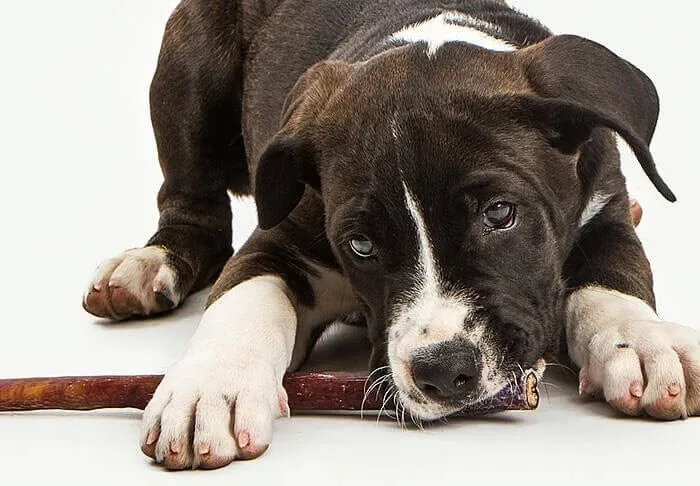 Various long-lasting bully sticks for dogs displayed on a wooden surface, highlighting durable chew options.
Various long-lasting bully sticks for dogs displayed on a wooden surface, highlighting durable chew options.
A wide variety of safe and natural dog chews that last a long time are available, but selecting the right one for your pet is paramount. The ideal chew should suit your dog’s size, health status, and chewing style to ensure it is both safe and effective. Here are a few key considerations when choosing a long-lasting dog chew:
Low-Fat Chews For Dogs
Managing your pet’s weight often involves carefully limiting calories to match their activity level and metabolism. When caring for an overweight dog, treats are typically the first items cut from their routine. Many natural chews are high in calories, and adding them on top of a complete and balanced diet can lead to your pet regularly consuming more calories than they expend.
While cutting out treats and chews can help your pet achieve weight goals, it also means missing out on the many health benefits these natural options provide. Fortunately, some excellent lower-fat dog chews that last a long time allow your dog to enjoy their chew without excessive calories.
Look for leaner options when selecting a dog chew. You might not be able to offer natural chews as frequently as before, but you don’t have to eliminate them entirely. If you give your dog a natural chew, you can balance their daily caloric intake by reducing the size of their meal slightly. Even better, complement the chew with an extra-long walk or a vigorous game of fetch to help burn off any additional calories consumed.
Natural Chews for Teething Puppies
If you have a teething puppy, you understand the critical importance of providing them with appropriate objects to chew on. Natural chews offer a safe and nutritious alternative to your puppy gnawing on furniture, shoes, or even you!
During the teething stage, typically between 4 weeks and 6 months of age, puppies experience discomfort and a strong urge to chew. This chewing helps relieve pain, loosens baby teeth, and encourages adult teeth to emerge through the gums.
It is crucial to select a safe chew specifically designed for puppies that will ease teething pain without damaging their delicate teeth. Avoid chews that are too hard or dense, as both baby teeth and freshly erupted adult teeth are highly susceptible to cracking or breaking. For guidance on suitable options, consider what makes [the best chew bone for puppies] or [a good chew bone for puppies] to ensure their safety and comfort during this vital developmental stage.
Long Lasting Chews for Dog Food Allergies
Finding appropriate treats for dogs with allergies can be challenging. Many widely available natural chew options contain common protein allergens. However, itchy dogs need to chew too, so you’ll need to find dog chews that last a long time and won’t trigger your dog’s allergies. Look for alternative and exotic proteins to satisfy their chewing needs without causing a reaction.
Your options may be more limited when exclusively offering novel proteins, but fortunately, several types of natural chews can keep your allergic pet satisfied. Explore options like raw bones from exotic animals such as kangaroo or goat, or other single-ingredient chews derived from less common sources.
For dogs with extremely powerful jaws or an unyielding determination to destroy, the term “long-lasting dog chew” might be seen as a challenge. These dogs often view average natural chews as child’s play. In such cases, you’ll need robust, extra-durable natural chews with serious staying power to keep them safely occupied.
Long Lasting Dog Chew Safety Tips
When selecting dog chews that last a long time, safety should always be your top priority. While some natural chews are generally regarded as safer than others, their safety also depends on their hardness, digestibility, and size. Giving the right chew to your dog means choosing the safest option and understanding best practices for feeding them.
Here are 6 essential tips to help you confidently make safe and responsible choices for your dog’s chews:
1. Tougher Doesn’t Always Mean Better
When searching for dog chews that last a long time, it’s easy to assume that the sturdiest option will always be the best. However, this isn’t necessarily true. The harder the chew, the higher the risk of tooth damage. Items like bones, antlers, and cow hooves are popular among tough, aggressive chewers, but they can be too hard for many dogs. While some dogs may chew these without incident, the risk of dental injury remains significant.
Hard chews are generally unsuitable for puppies, senior dogs, or dogs with compromised dental health. The risk of tooth damage, including fractures, is simply too high.
A good rule of thumb is to stick to chews that you can indent slightly with your thumbnail. This doesn’t completely eliminate the risk of your dog damaging their teeth, but it significantly decreases the odds.
Always prioritize your dog’s dental health over a chew’s longevity. A chew that lasts a very long time but causes a fractured tooth is not a beneficial choice.
2. Digestibility
The ease with which your dog’s body can break down a chew is a crucial safety factor. Some chews are far more digestible than others. Rawhides, for example, have long been a subject of concern due to their poor digestibility. While rawhide does digest more slowly than less processed animal chews, the primary risks associated with it lie in how dogs chew and swallow them.
As rawhide is chewed, it becomes soggy and slimy, resembling a large, flat piece of gum. This altered texture often allows dogs to swallow larger, poorly digested pieces, which can lead to choking or intestinal blockages.
In contrast, connective tissues and cartilage tend to chew down more safely and digest quicker. This means the risk of digestive issues from chews like bully sticks or tendons is considerably lower. Exploring safe rawhide alternatives can provide a healthier and more digestible long-lasting dog chew option for dogs who enjoy that particular texture.
3. Size Matters
When selecting all-natural, long-lasting dog chews, there’s one simple rule to remember: it’s very difficult to choose a chew that’s too big, but very easy to pick one that’s too small. Offering your dog a chew that is too small is a recipe for a choking hazard or a bowel obstruction.
Dogs often get excited about their chews and lack the foresight to understand that swallowing a large chunk of bone or yak cheese might not pass through their digestive system safely. Always opt for larger chews that cannot be swallowed whole. Furthermore, remove the chew when it becomes small enough to pose a significant risk of being swallowed or choked on. Prioritizing the appropriate size ensures a safer and more enjoyable chewing experience.
4. Supervise Your Pet
Regardless of the type or perceived safety of a chew, it is highly recommended that you monitor your pet whenever they are chewing on a toy or treat. Even the safest dog chews that last a long time can become a choking risk if your dog tries to bite it incorrectly or swallows a piece too quickly.
Even if you are confident in your dog’s chewing habits, it’s always better to be safe than sorry. When introducing a new treat or chew, closely supervise them to ensure they are chewing safely and appropriately. Any dog can make a mistake—getting a chew stuck, breaking a tooth, or swallowing something they shouldn’t. Accidents happen, but by choosing appropriate treats for your dog and monitoring their chewing habits, you significantly reduce the risk of injury or emergency.
5. Wash Your Hands
.webp)
Some natural chews can appear quite unappetizing – they might be greasy, slimy, or even bloody, immediately prompting you to wash your hands. However, not all chews look so unappealing. Regardless of the type of chew you offer your dog, it is essential to wash your hands thoroughly after you touch it.
Washing your hands is recommended after touching anything that goes into your dog’s mouth. Food, chews, and even certain cookies can harbor fats and bacteria that could go rancid or potentially make you sick. While not common, the possibility exists.
It’s important to note that not all natural chews are cooked. Many are smoked or baked, but freeze-dried or dehydrated chews can contain the same bacteria found on raw meat or bones. While these bacteria typically won’t harm your dog, they could affect you and your family. As long as you maintain proper hygiene by washing your hands and any surfaces the natural chew touched, the risk of bacterial transmission is slight.
6. Don’t Let Them Chew Just Anything
Most dogs are enthusiastic chewers and will happily gnaw on almost anything they find. However, it is crucial to understand the dangers of letting them chew on items not intended for consumption. Sticks, rocks, and shoes are just a few examples of common objects your dog should never chew on.
Allowing your dog to chew on random items can lead to serious health issues, including choking, stomach blockages, and severe tooth damage. These dangerous “chews” can often be found in your house, your yard, or at the park. Being aware of potential hazards in your environment and keeping a close eye on what your dog puts in their mouth is vital. Always have a safe, natural chew option readily available to redirect these harmful behaviors. This vigilance ensures your dog’s safety and prevents costly veterinary emergencies.
25 Best Dog Chews That Last a Long Time
For those canines who seem to take the term “long-lasting dog chew” as a personal challenge, finding truly durable options is essential. While no chew is entirely indestructible – especially when faced with the powerful jaws of certain breeds – the goal is to find chews that provide sustained benefits for as long as possible.
Here are 25 excellent dog chews that last a long time, specifically curated for power chewers and dogs with an unyielding determination:
1. Bully Sticks
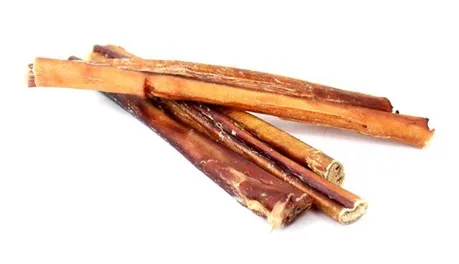 Eldon's Free-Range Odourless Bully Sticks, a top choice for long-lasting dog chews, in various lengths.Bully sticks are consistently ranked among the safest and most popular dog chews that last a long time. They are perfect for dogs of nearly any age, size, or breed. Their toughness provides a satisfying chewing experience without posing a significant risk of tooth damage. Made from beef pizzle, bully sticks are high in protein, low in fat, and remarkably easy to digest, making them a healthy and safe choice for all dogs.
Eldon's Free-Range Odourless Bully Sticks, a top choice for long-lasting dog chews, in various lengths.Bully sticks are consistently ranked among the safest and most popular dog chews that last a long time. They are perfect for dogs of nearly any age, size, or breed. Their toughness provides a satisfying chewing experience without posing a significant risk of tooth damage. Made from beef pizzle, bully sticks are high in protein, low in fat, and remarkably easy to digest, making them a healthy and safe choice for all dogs.
We Recommend: Eldon’s Free-Range Odourless Bully Sticks
2. Beef Tendons
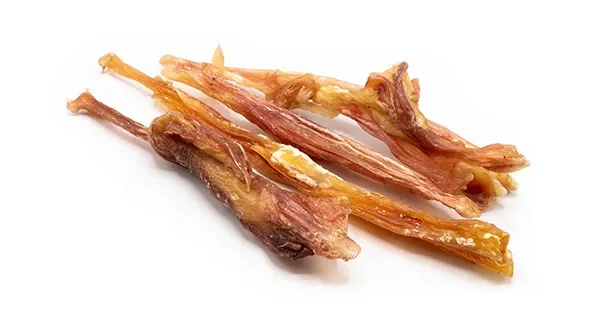 Eldon's Beef Tendons, flexible and durable dog chews excellent for dental health.Beef tendons are an excellent choice for your dog’s dental care. Their unique, string-like texture works similarly to dental floss, helping to clean between teeth. As the tendon softens with chewing, it can reach into crevices, reducing plaque, tartar, and bacteria buildup in hard-to-reach areas of your dog’s mouth. Tendons are hard when dry but become pliable as your dog chews, making them safe for all ages, breeds, and sizes, ensuring a satisfying and beneficial chew that lasts.
Eldon's Beef Tendons, flexible and durable dog chews excellent for dental health.Beef tendons are an excellent choice for your dog’s dental care. Their unique, string-like texture works similarly to dental floss, helping to clean between teeth. As the tendon softens with chewing, it can reach into crevices, reducing plaque, tartar, and bacteria buildup in hard-to-reach areas of your dog’s mouth. Tendons are hard when dry but become pliable as your dog chews, making them safe for all ages, breeds, and sizes, ensuring a satisfying and beneficial chew that lasts.
We Recommend: Eldon’s Beef Tendons
3. Not-hides
/Long%20Lasting%20Dog%20Chews%20to%20Keep%20Your%20Dog%20Busy/fieldcrest-farms-nothin-to-hide-bacon.webp)
Rawhide has long been the most recognized and affordable chew option, but it’s also widely considered one of the most dangerous due to poor digestibility and choking risks. Instead of traditional rawhide, consider safer rawhide alternatives. Many “no-hide,” “hide-free,” and collagen-based dog chews offer the appealing texture and taste of rawhide without the associated dangers. These innovative dog chews that last a long time provide a much safer option for extended chewing enjoyment.
We Recommend: Fieldcrest Farms Nothin’ to Hide
4. Lamb Horns
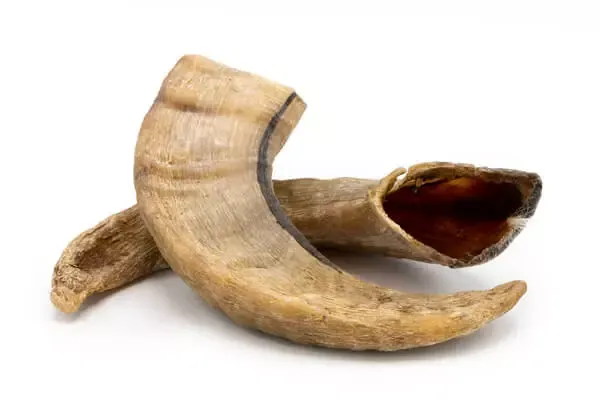 Icelandic Lamb Horns, a unique and very hard long-lasting dog chew, suitable for all chewing styles.Lamb horns are among the more unique types of dog chews that last a long time. These are hard, durable chews suitable for all ages and chewing styles, and importantly, they are not as dense as antlers or bones, which reduces the risk of tooth damage. Lamb horns with marrow offer a nutrient-rich and higher-calorie treat, ideal for young or active dogs. Horns without marrow can be a great lower-calorie chewing option for dogs needing weight management, or they can be stuffed with tasty, dog-safe fillings like peanut butter to create an interactive and stimulating activity.
Icelandic Lamb Horns, a unique and very hard long-lasting dog chew, suitable for all chewing styles.Lamb horns are among the more unique types of dog chews that last a long time. These are hard, durable chews suitable for all ages and chewing styles, and importantly, they are not as dense as antlers or bones, which reduces the risk of tooth damage. Lamb horns with marrow offer a nutrient-rich and higher-calorie treat, ideal for young or active dogs. Horns without marrow can be a great lower-calorie chewing option for dogs needing weight management, or they can be stuffed with tasty, dog-safe fillings like peanut butter to create an interactive and stimulating activity.
We Recommend: Icelandic Lamb Horns
5. Raw Bones
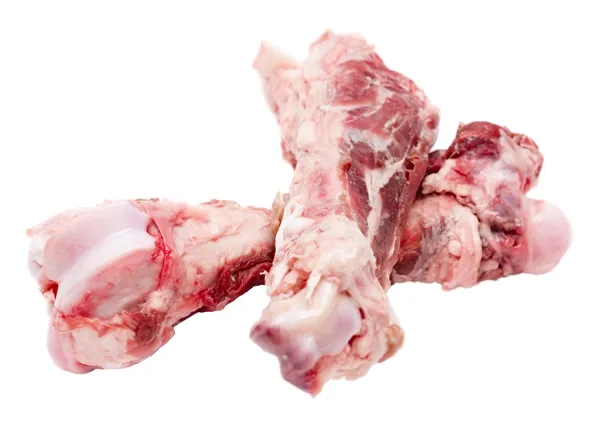 A large raw beef bone, offering essential minerals and a safe, long-lasting chew for dogs.Raw bones are unequivocally the safest way to offer bones to your dog. Unlike cooked bones, which become brittle and prone to splintering, raw bones are softer, allowing dogs to chew off small, digestible pieces. This makes them a much safer alternative that provides significant dental benefits while supplying essential minerals like calcium and phosphorus, crucial for maintaining skeletal structure and organ function. Raw bones are an excellent choice for a natural, long-lasting dog chew that promotes health.
A large raw beef bone, offering essential minerals and a safe, long-lasting chew for dogs.Raw bones are unequivocally the safest way to offer bones to your dog. Unlike cooked bones, which become brittle and prone to splintering, raw bones are softer, allowing dogs to chew off small, digestible pieces. This makes them a much safer alternative that provides significant dental benefits while supplying essential minerals like calcium and phosphorus, crucial for maintaining skeletal structure and organ function. Raw bones are an excellent choice for a natural, long-lasting dog chew that promotes health.
We Recommend: Big Country Raw Turkey Neck
6. Collagen Chews
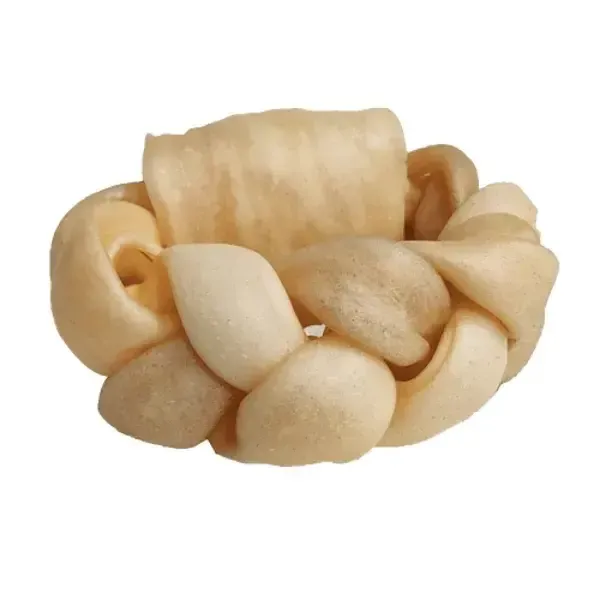 Red Barn Beef Collagen Ring, a highly digestible and durable chew supporting dog's joint health.If traditional bones are too tough or high in calories for your dog, collagen chews offer an excellent alternative. These natural chews are derived from the inner layer of hide, but unlike rawhide, they are not chemically treated, making them fully digestible. Collagen chews come in various shapes and sizes, from stretched sticks for smaller dogs and puppies to rolled and braided forms resembling thick rawhide, creating a more robust and long-lasting dog chew for determined chewers. They are highly beneficial for joint health and skin.
Red Barn Beef Collagen Ring, a highly digestible and durable chew supporting dog's joint health.If traditional bones are too tough or high in calories for your dog, collagen chews offer an excellent alternative. These natural chews are derived from the inner layer of hide, but unlike rawhide, they are not chemically treated, making them fully digestible. Collagen chews come in various shapes and sizes, from stretched sticks for smaller dogs and puppies to rolled and braided forms resembling thick rawhide, creating a more robust and long-lasting dog chew for determined chewers. They are highly beneficial for joint health and skin.
We Recommend: Red Barn Beef Collagen Ring
7. Elk Antlers
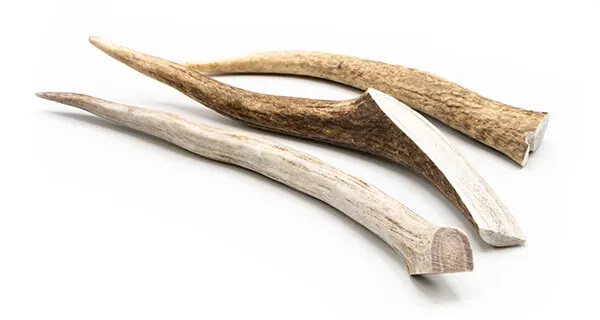 Eldon's Elk Antlers, extremely dense and hard natural chews perfect for power-chewing dogs.For dogs that simply can’t get enough to chew, elk antlers are an ideal option. These chews are extremely dense and hard, making them a perfect choice for determined and powerful chewers looking for dog chews that last a long time. Elk naturally shed their antlers annually, meaning no animals are harmed in sourcing these tough dog chews. However, like bones, antlers have the potential to damage teeth if a dog chews too aggressively or has compromised dental health, so they should be avoided for puppies, seniors, and dogs with dental issues.
Eldon's Elk Antlers, extremely dense and hard natural chews perfect for power-chewing dogs.For dogs that simply can’t get enough to chew, elk antlers are an ideal option. These chews are extremely dense and hard, making them a perfect choice for determined and powerful chewers looking for dog chews that last a long time. Elk naturally shed their antlers annually, meaning no animals are harmed in sourcing these tough dog chews. However, like bones, antlers have the potential to damage teeth if a dog chews too aggressively or has compromised dental health, so they should be avoided for puppies, seniors, and dogs with dental issues.
We Recommend: Puppy Love Elk Antler
8. Beef Hooves
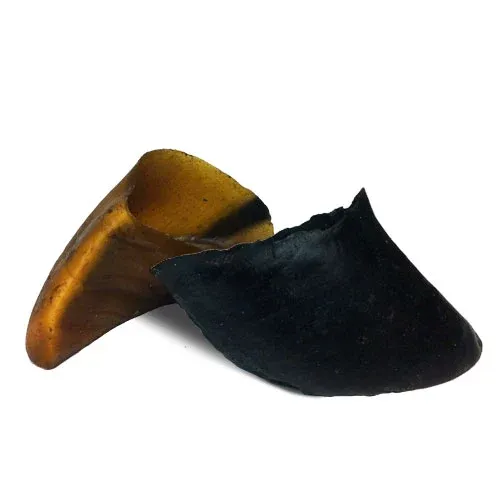 Large beef hooves, durable and stuffable dog chews that provide long-lasting entertainment.If you have a big chewer, beef hooves offer durable, natural, and long-lasting dog chews with a unique advantage: their natural cavity. This cavity allows them to be stuffed with food, treats, or peanut butter, adding an extra layer of enjoyment and engagement. Hooves also possess a strong odor that dogs find highly appealing (even if humans don’t!). Despite the smell, they are a fun and versatile option that can encourage even pickier pets to chew.
Large beef hooves, durable and stuffable dog chews that provide long-lasting entertainment.If you have a big chewer, beef hooves offer durable, natural, and long-lasting dog chews with a unique advantage: their natural cavity. This cavity allows them to be stuffed with food, treats, or peanut butter, adding an extra layer of enjoyment and engagement. Hooves also possess a strong odor that dogs find highly appealing (even if humans don’t!). Despite the smell, they are a fun and versatile option that can encourage even pickier pets to chew.
We Recommend: Eldon’s Beef Hooves
9. Coffee Wood Chews
/Long%20Lasting%20Dog%20Chews%20to%20Keep%20Your%20Dog%20Busy/spot-coffee-wood-chew_4__1.webp)
While wood might seem like the last thing you’d want your dog to chew, coffee wood chews are surprisingly durable and calorie-free. They are also odor-free and won’t stain, making them an ideal long-lasting dog chew for indoor use. Unlike typical sticks and branches found outdoors, coffee wood is made from densely packed fibers. Although hard to the touch initially, it softens as your dog chews, significantly reducing the risk of splintering. This makes it a much safer alternative to random sticks.
We Recommend: Spot Coffee Wood
10. Beef Strips
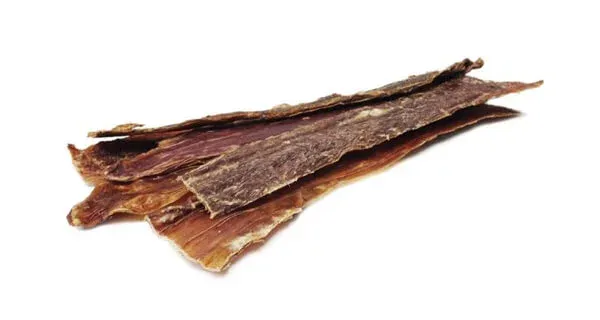 Eldon's Angus Beef Strips, crunchy and digestible chews suitable for less aggressive chewers and puppies.Angus Beef Strips are typically made from beef esophagus, sourced from grass-fed cows and often free of hormones and antibiotics, with no added smoke flavor or preservatives. Their texture is similar to a crunchy jerky, making them great for less aggressive chewers, puppies, and dogs with missing teeth. The thin strips soften as they are chewed, allowing your dog to safely eat and digest them. While not the absolute longest-lasting, they offer a good duration for moderate chewers and are a healthy, digestible option for a dog chew that lasts a long time relative to their size.
Eldon's Angus Beef Strips, crunchy and digestible chews suitable for less aggressive chewers and puppies.Angus Beef Strips are typically made from beef esophagus, sourced from grass-fed cows and often free of hormones and antibiotics, with no added smoke flavor or preservatives. Their texture is similar to a crunchy jerky, making them great for less aggressive chewers, puppies, and dogs with missing teeth. The thin strips soften as they are chewed, allowing your dog to safely eat and digest them. While not the absolute longest-lasting, they offer a good duration for moderate chewers and are a healthy, digestible option for a dog chew that lasts a long time relative to their size.
We Recommend: Eldon’s Angus Beef Strips
11. Chomper Sticks
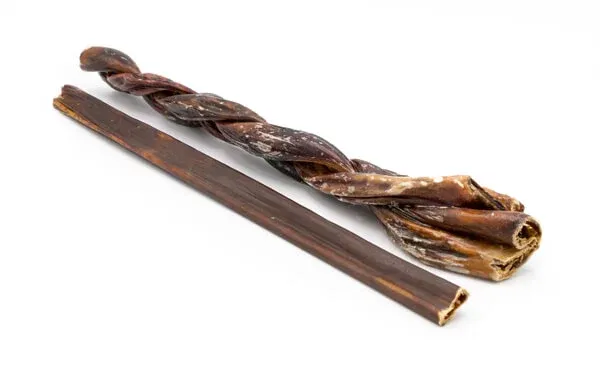 Eldon's Beef Chomper Sticks, high-protein dog chews that aid in dental cleaning for all dog sizes.Similar to Angus Strips, Beef Chomper Sticks are often made from high-quality beef sources. These sticks are generally a bit tougher than Angus Strips, yet still suitable for most breeds and sizes. Their thinner shape allows them to effectively scrape against hard-to-reach teeth during chewing, contributing to better dental hygiene. Chompers are highly digestible, offering a safe and tasty natural chew option. They are available in various lengths, so always choose the size that best suits your dog’s size and chewing intensity for optimal safety and longevity.
Eldon's Beef Chomper Sticks, high-protein dog chews that aid in dental cleaning for all dog sizes.Similar to Angus Strips, Beef Chomper Sticks are often made from high-quality beef sources. These sticks are generally a bit tougher than Angus Strips, yet still suitable for most breeds and sizes. Their thinner shape allows them to effectively scrape against hard-to-reach teeth during chewing, contributing to better dental hygiene. Chompers are highly digestible, offering a safe and tasty natural chew option. They are available in various lengths, so always choose the size that best suits your dog’s size and chewing intensity for optimal safety and longevity.
We Recommend: Eldon’s Beef Chomper Sticks
12. Knuckle Bones
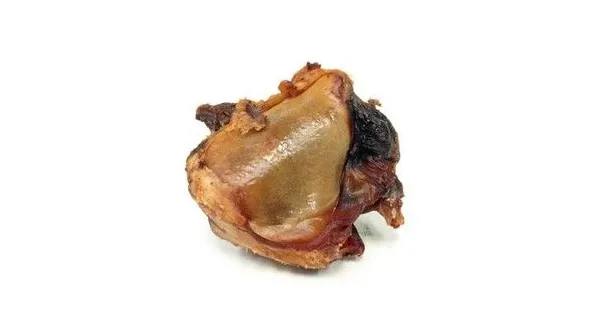 Silver Spur ASADO Beef Knuckle Bones, natural dog chews rich in cartilage and bone, supporting hip and joint health.Knuckle bones are a popular natural treat and an excellent long-lasting dog chew, often made from 100% beef kneecaps. Composed mainly of beef cartilage and bone, they are highly beneficial for hip and joint health, providing natural glucosamine and chondroitin. Unlike many other recreational bones, kneecaps are less likely to splinter, making them a safer alternative for tough chewers. They are typically smaller bones, so they might not be suitable for very large or giant breeds who could swallow them whole. Always supervise your dog to prevent choking or the swallowing of large chunks.
Silver Spur ASADO Beef Knuckle Bones, natural dog chews rich in cartilage and bone, supporting hip and joint health.Knuckle bones are a popular natural treat and an excellent long-lasting dog chew, often made from 100% beef kneecaps. Composed mainly of beef cartilage and bone, they are highly beneficial for hip and joint health, providing natural glucosamine and chondroitin. Unlike many other recreational bones, kneecaps are less likely to splinter, making them a safer alternative for tough chewers. They are typically smaller bones, so they might not be suitable for very large or giant breeds who could swallow them whole. Always supervise your dog to prevent choking or the swallowing of large chunks.
We Recommend: Silver Spur ASADO Beef Knuckle Bones
13. Pig and Beef Ears
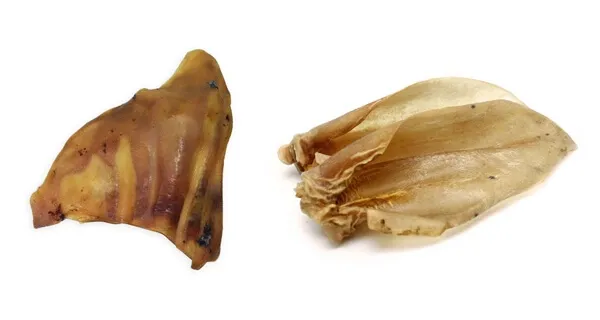 Assorted pig and beef ears, natural and flavorful long-lasting dog chews that promote dental hygiene.Dogs adore the texture and taste of natural pig ears or cow ears, making them a perennial favorite on any list of dog chews that last a long time. These are typically prepared in various ways, such as smoked, baked, dehydrated, or air-dried, to accommodate different needs. Smoked pig ears are often crunchy and irresistible. Beef ears, especially air-dried versions, can be a lower-calorie option and are excellent for dental care, as their thinner structure can work into hard-to-reach places in your dog’s mouth, aiding in plaque removal.
Assorted pig and beef ears, natural and flavorful long-lasting dog chews that promote dental hygiene.Dogs adore the texture and taste of natural pig ears or cow ears, making them a perennial favorite on any list of dog chews that last a long time. These are typically prepared in various ways, such as smoked, baked, dehydrated, or air-dried, to accommodate different needs. Smoked pig ears are often crunchy and irresistible. Beef ears, especially air-dried versions, can be a lower-calorie option and are excellent for dental care, as their thinner structure can work into hard-to-reach places in your dog’s mouth, aiding in plaque removal.
We Recommend: Noah’s Ark Cow’s Ears
14. Turkey Necks
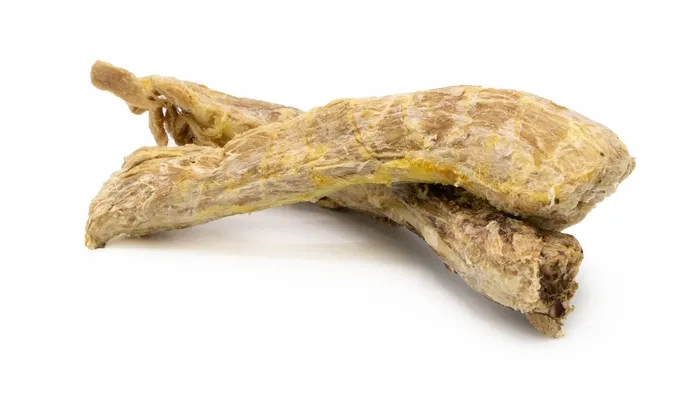 Vital Essentials Turkey Necks, edible raw poultry bones, a nutritious and satisfying chew for all dog sizes.Edible poultry bones are a fantastic way to provide your dog with a fun, tasty, and nutritious chew. It’s crucial to note that only raw poultry necks, feet, wing tips, and backs should be offered to dogs, as cooked poultry bones can splinter dangerously. Turkey necks, being one of the larger poultry options, are suitable for any size dog and can be offered frozen, fresh, dehydrated, or freeze-dried. These meaty bones are rich in protein and calcium, making them an excellent long-lasting dog chew option for growing, raw-fed puppies and adults alike.
Vital Essentials Turkey Necks, edible raw poultry bones, a nutritious and satisfying chew for all dog sizes.Edible poultry bones are a fantastic way to provide your dog with a fun, tasty, and nutritious chew. It’s crucial to note that only raw poultry necks, feet, wing tips, and backs should be offered to dogs, as cooked poultry bones can splinter dangerously. Turkey necks, being one of the larger poultry options, are suitable for any size dog and can be offered frozen, fresh, dehydrated, or freeze-dried. These meaty bones are rich in protein and calcium, making them an excellent long-lasting dog chew option for growing, raw-fed puppies and adults alike.
We Recommend: Vital Essentials Turkey Necks
15. Stuffed Beef Strips
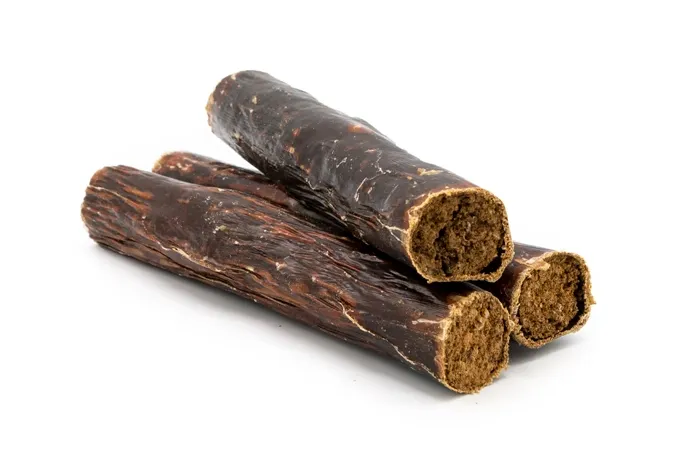 Eldon's Beef Stuffers, a delicious combination of chewy exterior and meat filling, ideal for picky pups.A favorite for picky pups, stuffed beef strips blend a chewy, tough exterior with a soft, flavorful meat filling. For example, Angus stuffers often feature a beef and tapioca filling wrapped in a thin layer of beef esophagus. While they may not last as long as some of the harder chews, they are gentle on the tummy and packed with an irresistible flavor that many dogs adore. It’s important to select the appropriate size, as large dogs might gulp them too quickly, and extra-small breeds may consume too many calories in one sitting.
Eldon's Beef Stuffers, a delicious combination of chewy exterior and meat filling, ideal for picky pups.A favorite for picky pups, stuffed beef strips blend a chewy, tough exterior with a soft, flavorful meat filling. For example, Angus stuffers often feature a beef and tapioca filling wrapped in a thin layer of beef esophagus. While they may not last as long as some of the harder chews, they are gentle on the tummy and packed with an irresistible flavor that many dogs adore. It’s important to select the appropriate size, as large dogs might gulp them too quickly, and extra-small breeds may consume too many calories in one sitting.
We Recommend: Eldon’s Beef Stuffers
16. Extruded Chew Sticks
/Long%20Lasting%20Dog%20Chews%20to%20Keep%20Your%20Dog%20Busy/etta-says-deluxe_chews.jpg)
Choosing a meaty pressed treat stick can be a great option for light to moderate chewers looking for dog chews that last a long time. These dense sticks are uniquely extruded, similar to kibble, to produce a hard, crunchy chew stick packed with flavor. You’ll find a wide variety of flavors and sizes designed to meet the unique chewing needs of your pet, including those with specific taste preferences or allergies. Their consistent density offers a satisfying chew that keeps dogs engaged.
We Recommend: Etta Says Deluxe Chew Sticks
17. Dental Chews
/Long%20Lasting%20Dog%20Chews%20to%20Keep%20Your%20Dog%20Busy/whimzeees-dental-chews-gator.webp)
Considering that one of the main benefits of natural chews for dogs is dental health, it’s no surprise that specialized dental chews make this list of dog chews that last a long time. Dental chew sticks and treats come in a variety of shapes and formulas, all designed to encourage your dog to chew while actively reducing plaque and tartar buildup. While not always the toughest chews on our list, they are an excellent option for puppies and smaller breeds who enjoy chewing but may not be able to handle anything too large or hard.
We Recommend: Whimzees Dental Chews
18. Bladder Sticks
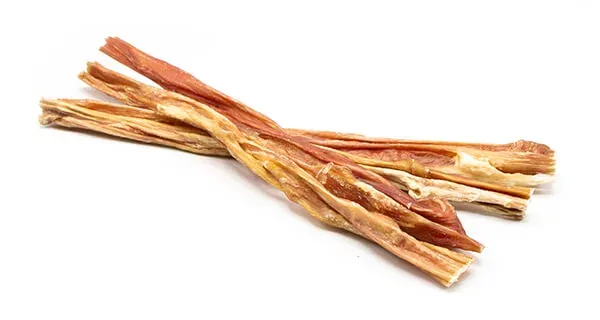 Eldon's Bladder Sticks, firm and collagen-rich dog chews that soften for dental care.Though they may seem like an unusual animal part, bladder sticks are cooked, long sticks made from a cow’s bladder. They typically have a strong, distinct smell that dogs find irresistible (though humans might prefer them outdoors or in a kennel!). The bladder is composed of muscle and connective tissues, similar to a tendon or ligament. They are firm when cooked and dried but soften significantly as your dog chews. Like tendons, bladder sticks are great for dental care and provide a healthy source of collagen to your pet’s diet, making them a unique long-lasting dog chew.
Eldon's Bladder Sticks, firm and collagen-rich dog chews that soften for dental care.Though they may seem like an unusual animal part, bladder sticks are cooked, long sticks made from a cow’s bladder. They typically have a strong, distinct smell that dogs find irresistible (though humans might prefer them outdoors or in a kennel!). The bladder is composed of muscle and connective tissues, similar to a tendon or ligament. They are firm when cooked and dried but soften significantly as your dog chews. Like tendons, bladder sticks are great for dental care and provide a healthy source of collagen to your pet’s diet, making them a unique long-lasting dog chew.
We Recommend: Eldon’s Bladder Sticks
19. Cod Sticks
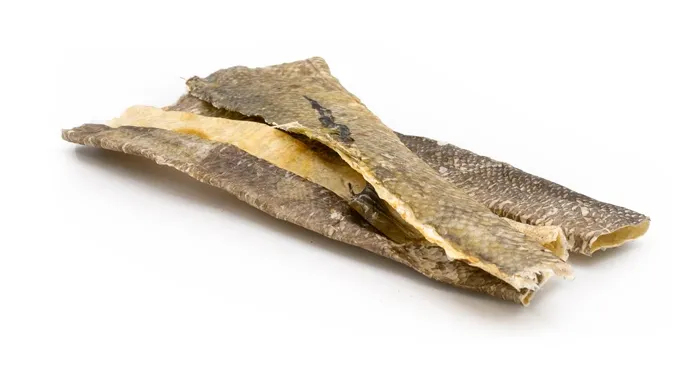 Icelandic+ Cod Sticks, soft and digestible fish skin chews ideal for teething puppies and sensitive tummies.Fish skins, particularly cod sticks, are an excellent dog chew that lasts a long time for teething puppies. They are soft enough to be easily digested but provide a satisfyingly chewy, “gummy” experience for puppies. If you can tolerate the fishy scent (which your puppy will undoubtedly love!), Icelandic+ Cod skins are a fantastic option. Brands like Icelandic+ often focus on sustainability and environmental impact, sourcing products that are free-range, grass-fed, or wild-caught from pristine environments, ensuring a high-quality, natural chew.
Icelandic+ Cod Sticks, soft and digestible fish skin chews ideal for teething puppies and sensitive tummies.Fish skins, particularly cod sticks, are an excellent dog chew that lasts a long time for teething puppies. They are soft enough to be easily digested but provide a satisfyingly chewy, “gummy” experience for puppies. If you can tolerate the fishy scent (which your puppy will undoubtedly love!), Icelandic+ Cod skins are a fantastic option. Brands like Icelandic+ often focus on sustainability and environmental impact, sourcing products that are free-range, grass-fed, or wild-caught from pristine environments, ensuring a high-quality, natural chew.
We Recommend: Icelandic+ Cod Sticks
20. Himalayan Yak Cheese
Himalayan yak cheese is a hard, natural product that many dogs find exceptionally tasty. Being non-staining and odor-free, it makes an excellent choice for an indoor-friendly long-lasting dog chew. It’s low-fat and generally more digestible than rawhide, bones, or antlers, making it irresistible to most dogs. As with any natural chew, always monitor your pet and remove the chew if it becomes small enough to be swallowed whole. Also, be mindful of the calorie content; while low in fat, yak cheese can be high in calories.
Pro Tip: If a yak cheese chew becomes too small to be safely chewed, you can microwave it on high power for 45-75 seconds. Let it cool for 2 minutes, and it will puff up into a crunchy, safe cheese treat!
We Recommend: Himalayan Yak Chews
21. Duck Feet
/Long%20Lasting%20Dog%20Chews%20to%20Keep%20Your%20Dog%20Busy/valuepack-duck-feet.webp)
Give your dog a satisfying crunch with a tasty dehydrated duck foot. This natural chew may not be particularly large, but it works as a great long-lasting dog chew for small-breed dogs, allowing them to eat the whole thing without consuming too many calories. Plus, it’s generally gentler on their teeth compared to more robust chews. While poultry bones might seem concerning, feet are among the few safe and completely edible options for dogs, along with necks, backs, and wing tips (when offered raw or dehydrated). They are rich in calcium, and dogs absolutely love the taste.
We Recommend: ValuePack Duck Feet
22. Beef Trachea
/Long%20Lasting%20Dog%20Chews%20to%20Keep%20Your%20Dog%20Busy/asado-beef-trachea.webp)
Cartilage is highly nutritious for dogs, which is why beef trachea makes our list of best dog chews that last a long time. Not only is it flavorful and nutritious, but it also offers a satisfying chew-crunch that dogs go crazy for. This type of chew is well-suited for small to medium-sized dogs and moderate chewers. Trachea is high in protein and a natural source of glucosamine, chondroitin, and collagen, all of which help support hip and joint health for dogs at all life stages. It’s also low in fat, making it a great chew for dogs needing weight management or those with sensitive tummies.
We Recommend: Silver Spur ASADO Beef Trachea
23. Rubber Chew Toys
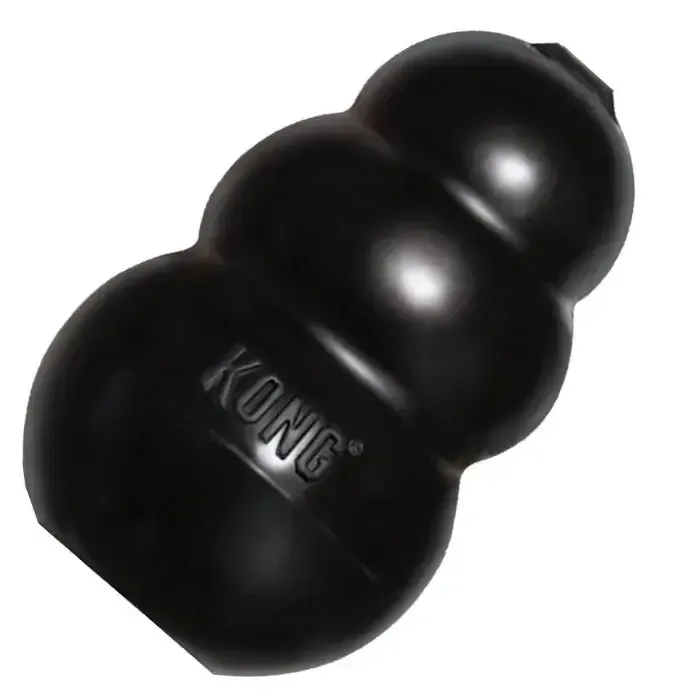 KONG Extreme, a durable black rubber chew toy designed for power chewers and long-lasting entertainment.For dogs who love to chew all day, a chew that cannot be consumed makes perfect sense for their health and weight management. Well-made rubber chew toys tend to last significantly longer than most consumable chews and often offer excellent value for money. If you invest in a good-quality rubber chew, your dog will likely get the most chew time for your money. Many can also be stuffed with treats or peanut butter to extend engagement, making them highly effective dog chews that last a long time.
KONG Extreme, a durable black rubber chew toy designed for power chewers and long-lasting entertainment.For dogs who love to chew all day, a chew that cannot be consumed makes perfect sense for their health and weight management. Well-made rubber chew toys tend to last significantly longer than most consumable chews and often offer excellent value for money. If you invest in a good-quality rubber chew, your dog will likely get the most chew time for your money. Many can also be stuffed with treats or peanut butter to extend engagement, making them highly effective dog chews that last a long time.
We Recommend: KONG Extreme
24. Nylon Chew Toys
/Long%20Lasting%20Dog%20Chews%20to%20Keep%20Your%20Dog%20Busy/benebone-zaggler-bacon.webp)
Nylon chews are an excellent, durable, and long-lasting dog chew option. They frequently come in various textures, shapes, and with special flavors to pique your dog’s interest. Some even feature textures designed to help clean your dog’s teeth. Flavored nylon bones are particularly good chews for overweight dogs as they provide zero calories. Scented, yummy-tasting varieties will retain your dog’s interest longer than plain nylon. However, like any non-edible chew toy, they are not meant to be consumed. A very small piece might pass safely, but these toys should never be eaten. Always supervise your dog with a nylon chew and regularly inspect it for damage.
We Recommend: Benebone
25. Rope Chews
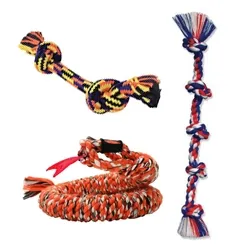 Mammoth Flossy Rope Chew Toys, ideal for dental cleaning and interactive play, suitable for teething puppies when frozen.An inexpensive and universally loved chew toy is the rope toy. These toys typically consist of cotton ropes braided into various shapes. For a natural chew, look for those made from 100% cotton fibers. As your dog’s teeth rub against the fibers, plaque and bacteria (which cause bad breath and gum inflammation) are removed, effectively “flossing” your dog’s teeth and freshening their breath. Dogs love chewing rope toys, and they’ll love it even more when you engage in a game of tug-of-war. For teething puppies, rope toys can be soaked in water and frozen to help relieve pain and discomfort from erupting teeth. However, this can get messy, so it’s best done in their kennel, outdoors, or on an easy-to-clean surface. Small fibers from rope toys can shed as your dog chews; while small fibers usually won’t harm your pet, it’s crucial to prevent your dog from eating the entire rope toy, which can be very dangerous. Never leave your dog unattended with a rope toy, and be prepared to take it away if they try to ingest it.
Mammoth Flossy Rope Chew Toys, ideal for dental cleaning and interactive play, suitable for teething puppies when frozen.An inexpensive and universally loved chew toy is the rope toy. These toys typically consist of cotton ropes braided into various shapes. For a natural chew, look for those made from 100% cotton fibers. As your dog’s teeth rub against the fibers, plaque and bacteria (which cause bad breath and gum inflammation) are removed, effectively “flossing” your dog’s teeth and freshening their breath. Dogs love chewing rope toys, and they’ll love it even more when you engage in a game of tug-of-war. For teething puppies, rope toys can be soaked in water and frozen to help relieve pain and discomfort from erupting teeth. However, this can get messy, so it’s best done in their kennel, outdoors, or on an easy-to-clean surface. Small fibers from rope toys can shed as your dog chews; while small fibers usually won’t harm your pet, it’s crucial to prevent your dog from eating the entire rope toy, which can be very dangerous. Never leave your dog unattended with a rope toy, and be prepared to take it away if they try to ingest it.
We Recommend: Mammoth Flossy Toys
10 Things You Should Never Let Your Dog Chew
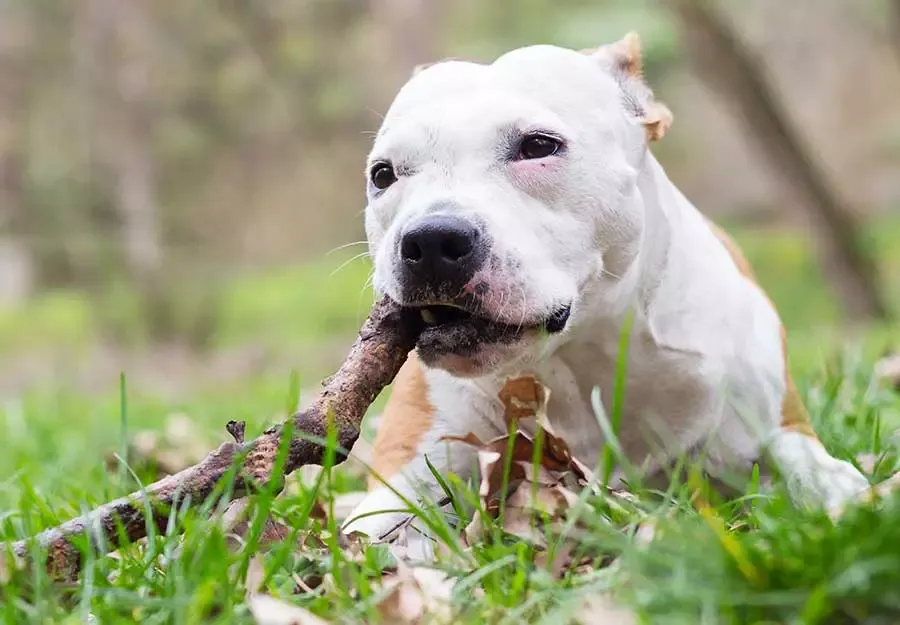 A dog playfully chewing on a stick, illustrating common but potentially harmful chewing habits.
A dog playfully chewing on a stick, illustrating common but potentially harmful chewing habits.
Dogs that love to chew often lack discernment when it comes to what they put in their mouths. This means they might be inclined to chew on things that could be extremely harmful to them. Many of these dangerous “chews” can commonly be found in your house, your yard, and at the park. It’s crucial to be aware of the potential dangers in your environment and to keep a close eye on your dog and the objects they attempt to chew.
You know your dog better than anyone, so actively scan your environment to remove threats and keep your dog close to avoid the temptation of picking up potentially harmful objects. Here are 10 dangerous things that dogs often love to chew but absolutely should not:
1. Sticks
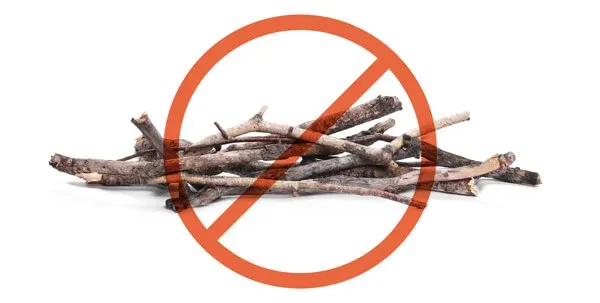 Various tree sticks on the ground, representing common objects dogs should avoid chewing due to splintering risks.This is a tough one because sticks are ubiquitous wherever there are trees and grass. Whether your dog is patrolling the yard or investigating a bush on your daily walk, they are likely to encounter sticks, twigs, and branches. For some, it’s a fun toy; for others, it might seem like a tasty snack. However, both scenarios pose a serious threat if you’re not careful. The risk of dry, splintered wood puncturing or cutting your dog’s mouth is high. Deadwood becomes dry and brittle, so any dog crunching on it is likely to break off small, sharp pieces that can damage their gums or, worse, their esophagus, stomach, or intestines.
Various tree sticks on the ground, representing common objects dogs should avoid chewing due to splintering risks.This is a tough one because sticks are ubiquitous wherever there are trees and grass. Whether your dog is patrolling the yard or investigating a bush on your daily walk, they are likely to encounter sticks, twigs, and branches. For some, it’s a fun toy; for others, it might seem like a tasty snack. However, both scenarios pose a serious threat if you’re not careful. The risk of dry, splintered wood puncturing or cutting your dog’s mouth is high. Deadwood becomes dry and brittle, so any dog crunching on it is likely to break off small, sharp pieces that can damage their gums or, worse, their esophagus, stomach, or intestines.
Instead of sticks, offer your dog a Coffee Wood Chew. These natural chews provide a similar mouthfeel but are much safer than dry sticks from the park, which have a high chance of splintering.
Even during a game of fetch, a stick caught improperly can get lodged in the mouth, break teeth, or damage eyes if your dog fumbles the catch. While you can’t account for every freak accident, you can choose safer fetch toys like tennis balls or frisbees.
2. Rocks
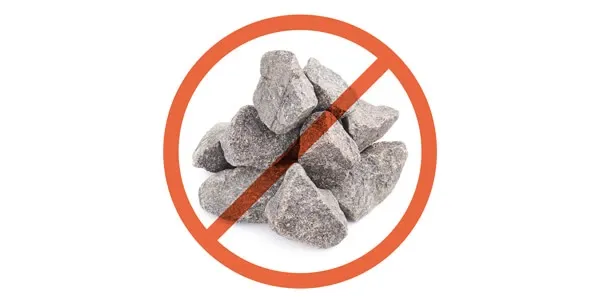 Small river rocks, highlighting dangerous items dogs might chew on, risking tooth damage or blockages.It’s easy for a dog to perceive a rock as a fun chew or toy, especially when they see humans skipping them across ponds or casually kicking them. It can become a tempting “game.” However, for dogs that play with rocks, particularly those that chew them, their dental health is severely at risk. Rocks of any size can easily break or crack their teeth, causing severe pain and potentially leading to expensive veterinary bills.
Small river rocks, highlighting dangerous items dogs might chew on, risking tooth damage or blockages.It’s easy for a dog to perceive a rock as a fun chew or toy, especially when they see humans skipping them across ponds or casually kicking them. It can become a tempting “game.” However, for dogs that play with rocks, particularly those that chew them, their dental health is severely at risk. Rocks of any size can easily break or crack their teeth, causing severe pain and potentially leading to expensive veterinary bills.
If swallowed, larger rocks can present a significant choking hazard or cause intestinal blockages. Even smaller rocks can accumulate to create obstructions in the intestines or damage the delicate soft tissues of the digestive tract.
Instead of rocks, give your dog some Himalayan Yak Cheese. These tasty chews offer a satisfyingly hard crunch with significantly less risk to your dog’s dental health.
If you suspect that your dog has swallowed rocks, contact your veterinarian immediately. While the rocks may pass naturally, you need to know what symptoms to monitor for over the next 24-48 hours.
3. Cooked Bones
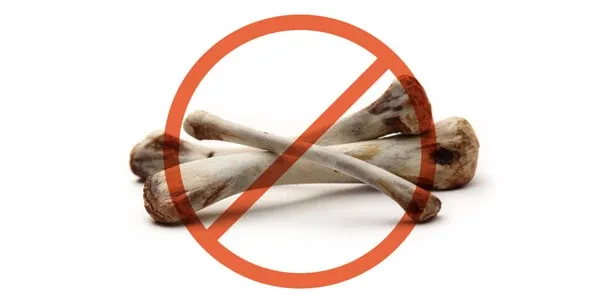 Cooked bones from a meal, a common but unsafe chew option for dogs due to splintering.This remains a controversial topic, as cooked bones are sometimes sold in pet stores and can appear to offer dental benefits for dogs who are fortunate enough not to suffer the severe consequences. While chewing is vital for dental health, cooked bones become brittle and hard. This increases the risk of cracked or damaged teeth. Moreover, the bone can easily splinter into sharp pieces that can cut your dog’s gums or, more dangerously, puncture their esophagus, stomach, or intestines, or cause blockages.
Cooked bones from a meal, a common but unsafe chew option for dogs due to splintering.This remains a controversial topic, as cooked bones are sometimes sold in pet stores and can appear to offer dental benefits for dogs who are fortunate enough not to suffer the severe consequences. While chewing is vital for dental health, cooked bones become brittle and hard. This increases the risk of cracked or damaged teeth. Moreover, the bone can easily splinter into sharp pieces that can cut your dog’s gums or, more dangerously, puncture their esophagus, stomach, or intestines, or cause blockages.
While these severe incidents don’t happen to every dog, the risk is very real, so extreme caution is advised when considering any type of cooked bone.
Raw Bones are a much safer alternative to cooked or smoked bones. Although they are still a dog chew that lasts a long time, raw bones have a significantly lower risk of splintering.
Some dogs may have eaten cooked bones for years without issues, which is often attributed to luck. If you do choose to feed cooked bones, it is strongly recommended that you supervise your dog at all times. This vigilance might allow you to intervene and remove a bone or piece of bone that appears dangerous before an accident occurs.
4. Plastic Bottles
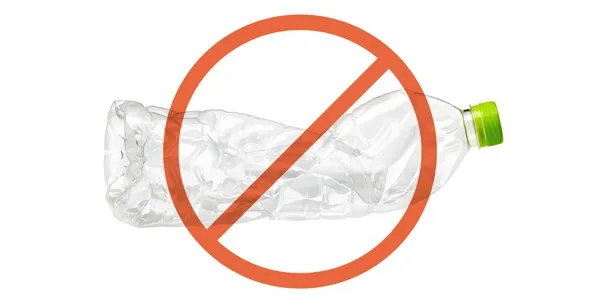 An empty plastic water bottle, a tempting but hazardous chew toy for dogs that can cause cuts or blockages.Perhaps it’s the distinctive sound or the satisfying crunch, but many dogs are captivated by empty plastic bottles. Chewing them can be both engaging and satisfying for a dog. For prey-driven dogs, it might even mimic the sensation of crunching down on fresh prey. It’s common to use plastic bottles as part of DIY toys or treat dispensers, which can be safe if your dog is not aggressively trying to destroy and ingest the bottle.
An empty plastic water bottle, a tempting but hazardous chew toy for dogs that can cause cuts or blockages.Perhaps it’s the distinctive sound or the satisfying crunch, but many dogs are captivated by empty plastic bottles. Chewing them can be both engaging and satisfying for a dog. For prey-driven dogs, it might even mimic the sensation of crunching down on fresh prey. It’s common to use plastic bottles as part of DIY toys or treat dispensers, which can be safe if your dog is not aggressively trying to destroy and ingest the bottle.
However, if your dog is an aggressive chewer, a tougher toy designed to withstand their bite will be much safer. Plastic is not digestible, and as your dog chews on a bottle, sharp pieces and jagged edges can form, potentially cutting your dog’s mouth and irritating their esophagus. Thin plastic bottles are easily destroyed, and swallowing larger chunks can lead to choking or intestinal blockages.
Dogs that love chewing plastic will likely enjoy a durable rubber chew toy. Try to find toys tough enough to withstand your dog’s bite, and always supervise their chewing sessions.
Make sure your recycling is safely stored out of your dog’s reach. If your recycling bin is accessible, your dog might be tempted to sneak a quick chomp of these makeshift and dangerous toys.
5. Ice Treats
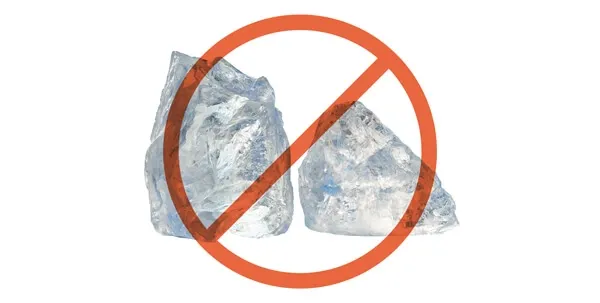 Clear ice cubes in a glass, representing frozen treats that can be too hard and damaging for dog's teeth.Most dogs enjoy an occasional ice cube. Many of us have dropped a cube and quickly called Fido over to clean up our mess. A single small ice cube is unlikely to cause any harm, but larger blocks of ice are far too hard and can severely damage your dog’s teeth.
Clear ice cubes in a glass, representing frozen treats that can be too hard and damaging for dog's teeth.Most dogs enjoy an occasional ice cube. Many of us have dropped a cube and quickly called Fido over to clean up our mess. A single small ice cube is unlikely to cause any harm, but larger blocks of ice are far too hard and can severely damage your dog’s teeth.
Puppies, seniors, and dogs with existing dental issues, who might be seeking a cold, safe chew, should particularly avoid chewing on ice. The risk to their teeth is even greater. If your dog is an “ice cube fiend” or you want to help cool them down in the summer, try freezing shallow ice cubes or using a pet-safe treat mold to create smaller, more manageable pieces. These will be easier to chew and will melt quickly in their mouth, reducing dental risk.
Freezing ice inside a durable rubber toy is another great way to offer a refreshing treat. The toy itself provides a protective barrier, and the ice will begin to melt into smaller, safer pieces before your dog can extract it. For a more nutritious frozen treat, try making homemade “dogsicles” with pureed fruits, vegetables, or yogurt.
6. Furniture
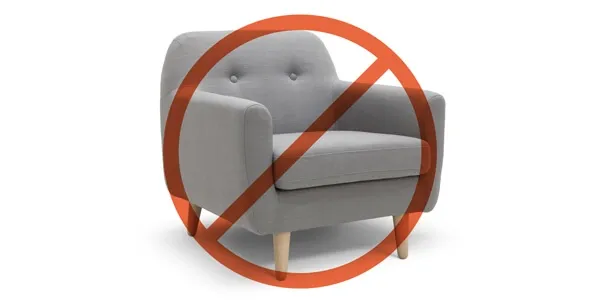 A close-up of chewed wooden furniture leg, indicating destructive chewing behavior in dogs.Not everything on our list is something you’d want your dog to consider a chew toy. Destructive chewing on furniture is a common sign of anxiety, boredom, or frustration in dogs. The materials used in furniture can be toxic if swallowed, so it’s critical to quickly address and break this habit to keep your dog safe.
A close-up of chewed wooden furniture leg, indicating destructive chewing behavior in dogs.Not everything on our list is something you’d want your dog to consider a chew toy. Destructive chewing on furniture is a common sign of anxiety, boredom, or frustration in dogs. The materials used in furniture can be toxic if swallowed, so it’s critical to quickly address and break this habit to keep your dog safe.
Couches and other upholstered items might look like a giant stuffed toy to your dog, but the stuffing, foam, and fabrics inside are dangerous. They can lead to intestinal blockages, constipation, or choking. Beyond that, you have no way of knowing if the fabrics have been treated with flame-retardant chemicals or other substances that can be toxic if ingested.
Wooden furniture, such as tables, chairs, and even baseboards, can also become targets for a frustrated or teething puppy. These items not only pose a splintering risk but are typically finished with stains, varnishes, or paints that could be toxic to your dog.
When your dog starts nibbling on the couch, immediately offer a fun Plush Dog Toy instead. These can be quickly deployed to distract and redirect your dog from destructive behaviors.
If your dog exhibits this unhealthy anxiety-driven habit, investigate ways to calm their anxiety, provide more mental stimulation, or consider crate training your dog for supervised periods when they are unsupervised.
7. Metal
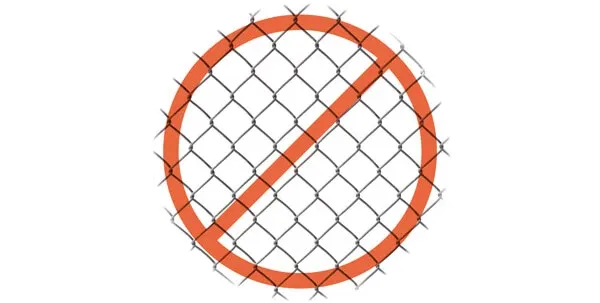 A metal chain link fence, a hazardous object for anxious dogs to chew on, risking tooth and gum injury.Another dangerous habit, often seen in anxiety-ridden dogs, is chewing on fences, crates, and anything else they perceive as confining them. While metal is less likely to break off and be ingested, the primary risk is severe damage to their mouth.
A metal chain link fence, a hazardous object for anxious dogs to chew on, risking tooth and gum injury.Another dangerous habit, often seen in anxiety-ridden dogs, is chewing on fences, crates, and anything else they perceive as confining them. While metal is less likely to break off and be ingested, the primary risk is severe damage to their mouth.
Chain link fences, chicken wire fencing, and the bars of a crate or kennel can be chewed if your dog is anxious about being confined. This can lead to broken teeth, erosion of protective enamel, and irritation or bleeding of their gums. In extreme cases, they may even bend or break bars or links in an attempt to escape, which significantly increases the potential for severe cuts and injuries. For dogs with extreme anxiety, it’s highly advisable to consult a professional trainer or veterinary behaviorist who can provide tools and methods to ease your dog’s stress safely.
Your anxious dog needs a distraction; try a Beef Trachea to occupy him. Offering a safe and edible natural chew can provide a safe and fun distraction during downtime, redirecting their chewing instincts.
8. Cardboard
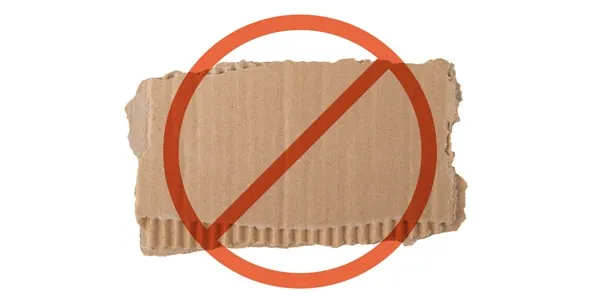 Torn cardboard pieces, illustrating a common household item dogs might chew on, posing a blockage risk.Cardboard is a common DIY toy material that can be fun to play with but is also tempting for dogs to eat. Most cardboard is considered non-toxic, but this doesn’t mean there’s no risk. Small pieces can be ingested and, when damp, will stick together, potentially accumulating into a thick, gooey mass in your dog’s stomach. This mass may become too large or dense to break apart or pass, leading to life-threatening intestinal blockages.
Torn cardboard pieces, illustrating a common household item dogs might chew on, posing a blockage risk.Cardboard is a common DIY toy material that can be fun to play with but is also tempting for dogs to eat. Most cardboard is considered non-toxic, but this doesn’t mean there’s no risk. Small pieces can be ingested and, when damp, will stick together, potentially accumulating into a thick, gooey mass in your dog’s stomach. This mass may become too large or dense to break apart or pass, leading to life-threatening intestinal blockages.
If your dog has ingested cardboard, keep a close eye out for symptoms such as vomiting, diarrhea, constipation, and lethargy. Also, monitor their bowel movements over the next day or two to ensure the cardboard is passing correctly.
Replace that cardboard with an Angus Strip. These thin, digestible chews will be much more appetizing than plain old cardboard and are a great way to help break this unsafe habit.
9. String, Ribbons, and Wire
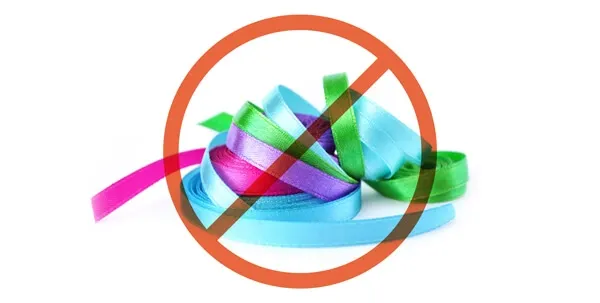 A roll of decorative ribbon, highlighting string-like items that are dangerous for dogs if ingested.Virtually anything string-like poses a significant risk to curious dogs. Decorations from holidays and parties, string from meat packaging, yarn, dental floss, or even loose threads from clothing can be extremely dangerous. The biggest risk is that the string can become tangled in the digestive tract, leading to a linear foreign body obstruction. This can constrict blood flow and cause severe damage to the sensitive tissues in the digestive system.
A roll of decorative ribbon, highlighting string-like items that are dangerous for dogs if ingested.Virtually anything string-like poses a significant risk to curious dogs. Decorations from holidays and parties, string from meat packaging, yarn, dental floss, or even loose threads from clothing can be extremely dangerous. The biggest risk is that the string can become tangled in the digestive tract, leading to a linear foreign body obstruction. This can constrict blood flow and cause severe damage to the sensitive tissues in the digestive system.
If it’s the “flossing” action your dog is craving, then give him a Beef Tendon. These chews soften as they chew and can slide between the teeth, effectively pulling out bacteria and food debris that contribute to bad dog breath, without the risks of string.
If you ever notice a string partially swallowed and hanging from your dog’s mouth, or peeking out of their behind, do not pull it out. It could be stuck on something internally, and attempting to force it out can cause more damage than good. Instead, call your veterinarian immediately. They will advise you on the safest course of action, which may involve surgical removal.
10. Shoes
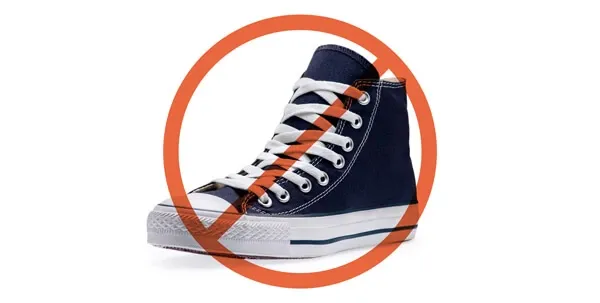 A chewed-up shoe, a classic example of a dangerous and destructive chew habit for puppies.It might be the oldest stereotype in the book, but chewing on shoes is a typical puppy habit, and most dog owners have plenty of anecdotal evidence to back this up. While this annoying and destructive habit can be infuriating, it’s crucial to consider how dangerous it is for our pets. Many materials used in shoes can be toxic if ingested. Dyes and adhesives could be harmful. As discussed, a shoestring can be a choking or ingestion hazard.
A chewed-up shoe, a classic example of a dangerous and destructive chew habit for puppies.It might be the oldest stereotype in the book, but chewing on shoes is a typical puppy habit, and most dog owners have plenty of anecdotal evidence to back this up. While this annoying and destructive habit can be infuriating, it’s crucial to consider how dangerous it is for our pets. Many materials used in shoes can be toxic if ingested. Dyes and adhesives could be harmful. As discussed, a shoestring can be a choking or ingestion hazard.
Bully Sticks are a great treat to make your dog forget about your shoes. They will last much longer and taste way better, providing a safe and satisfying alternative to destructive shoe chewing.
While any of us would be devastated if our favorite pair of kicks were demolished, the biggest offenders are often the cheapest: flip-flops. Everyone owns a few pairs of cheap, foamy flip-flops that get tossed in the car for road trips or lake visits. The material of these shoes has a particularly appealing texture to dogs. They are easy to destroy, but the pieces swallowed will not digest easily—or possibly not at all. Intestinal blockages are highly likely with spongy materials like these. Always keep shoes, no matter how replaceable, safely out of reach of your canine companions.
Choose Safety Over Fun
When searching for the best dog chews that last a long time, it’s easy to get caught up in the allure of their benefits. Some chews promise incredible longevity, while others boast superior nutritional value. However, not all chews are safe or appropriate for every dog. It is imperative that you always weigh the pros and cons of any chew, consider your dog’s individual chewing style, and assess the circumstances under which the chew will be given. Even the safest long-lasting dog chews can become dangerous if your dog chews them in an unsafe manner.
You might be looking for the absolute longest-lasting chew to provide your dog with hours of entertainment, but remember that the denser and sturdier the chew, the higher the potential risk of tooth damage, splintering, and digestive issues.
Always supervise your dog closely with any chew to proactively prevent the risk of choking or digestive emergencies. Your vigilance is key to their safety and well-being. When in doubt, it’s always better to be safe than sorry.
Frequently Asked Questions
What are long-lasting dog chews, and why are they beneficial for dogs?
Long-lasting dog chews are durable treats or toys specifically designed to keep dogs engaged and entertained for extended periods. They are beneficial for several reasons: promoting dental health by reducing plaque and tartar buildup, providing mental stimulation to combat boredom and anxiety, and satisfying a dog’s natural chewing instincts in a safe and appropriate manner.
What are some common types of long-lasting dog chews?
Common types of dog chews that last a long time include natural options like bully sticks, raw bones, antlers, Himalayan yak chews, beef tendons, and lamb horns. Non-edible options such as durable rubber chew toys, nylon chews, and specialized dental chews also fall into this category.
Are long-lasting dog chews safe for all dogs?
While many long-lasting dog chews are safe for most dogs, individual suitability varies. Factors like a dog’s age, size, chewing intensity, and existing dental health must be considered. Some dogs may also have allergies or sensitivities to certain ingredients, necessitating careful selection of hypoallergenic options. Always supervise your dog, especially when introducing a new type of chew.
How can I choose the right long-lasting chew for my dog?
To choose the right dog chew that lasts a long time for your pet, consider their size (to prevent choking), age (puppies and seniors need softer chews), chewing habits (aggressive chewers need tougher options), and any dietary restrictions or allergies. Consult your veterinarian for personalized recommendations, especially if your dog has dental issues or health concerns.
Can long-lasting chews help with dental hygiene?
Yes, many dog chews that last a long time are specifically designed to promote dental health. The act of chewing helps to mechanically scrape away plaque and tartar buildup on teeth, which can reduce the risk of gum disease and bad breath. Look for chews with textured surfaces or those known for their dental benefits, like dental sticks or certain natural tendons.
Are there any safety tips for giving my dog long-lasting chews?
Absolutely. Several key safety tips include: always supervising your dog while they are chewing, choosing chews that are appropriately sized for your dog to prevent choking, removing small or broken pieces, opting for chews that are slightly softer than your dog’s teeth (you should be able to indent them with your nail), and ensuring the chew is digestible. If your dog has a history of digestive issues, consult your veterinarian before introducing new chews into their diet. Remember to wash your hands after handling any chew.
